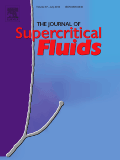
JOURNAL OF SUPERCRITICAL FLUIDS
metrics 2024
Illuminating the Future of Supercritical Fluid Studies
Introduction
The JOURNAL OF SUPERCRITICAL FLUIDS, publishing since 1988 and represented by Elsevier, stands as a pivotal platform for research in the dynamic fields of chemical engineering, condensed matter physics, and physical and theoretical chemistry. Located in the Netherlands, this esteemed journal focuses on the development and application of supercritical fluid technology, exploring its implications across diverse scientific disciplines. With impressive rankings, including Q2 in multiple categories, the journal reflects a strong commitment to advancing knowledge and innovation, thereby establishing its significant impact in the scientific community. Though not an open-access publication, it provides options for authors to ensure the visibility and reach of their work, appealing to researchers, professionals, and students alike. The JOURNAL OF SUPERCRITICAL FLUIDS continues to be a crucial resource for those dedicated to enhancing the understanding of supercritical fluid phenomena, fostering collaboration and inspiration among academics and practitioners worldwide.
Metrics 2024
 0.66
0.66 3.40
3.40 3.70
3.70 133
133Metrics History
Rank 2024
Scopus
IF (Web Of Science)
JCI (Web Of Science)
Quartile History
Similar Journals
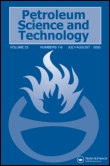
PETROLEUM SCIENCE AND TECHNOLOGY
Bridging academia and industry in energy innovation.PETROLEUM SCIENCE AND TECHNOLOGY, published by Taylor & Francis Inc, is a pivotal journal dedicated to advancing the multidisciplinary field of petroleum engineering and related technologies. With an ISSN of 1091-6466 and an E-ISSN of 1532-2459, this journal serves as a vital platform for disseminating research in areas ranging from geotechnical engineering to energy technology. As of 2023, it is recognized in the Q3 quartile across several categories, including Chemical Engineering and Fuel Technology, signifying its respectable standing within the academic community. With a convergence timeline from 1997 to 2024, the journal continuously addresses crucial issues in the energy sector, making it essential reading for researchers, industry professionals, and policy-makers alike. Although not an open access journal, its rigorous peer-reviewed articles contribute significantly to the advancement of knowledge and innovation within these fields, reflecting the journal's commitment to promoting scientific understanding and practical applications.

China Petroleum Processing & Petrochemical Technology
Transforming challenges into solutions in the petrochemical industry.China Petroleum Processing & Petrochemical Technology is a critical journal published by the China Petroleum Processing & Petrochemical Technology Press, focusing on the pivotal advancements within the field of petroleum processing and petrochemical technology. With ISSN 1008-6234, the journal has been a significant resource since its inception in 1999 and aims to disseminate original research articles, reviews, and case studies that contribute to knowledge and innovation in energy engineering, fuel technology, and chemical engineering. Despite its current Q4 status in various quartile rankings, it provides essential insights and research that are invaluable for researchers, professionals, and students interested in these expanding areas. The journal is located in Beijing, China, and continues to strive for excellence in academia, encouraging contributions that address pressing challenges in the petroleum and petrochemical industries while fostering a deeper understanding of process chemistry and technology.
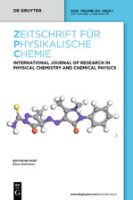
ZEITSCHRIFT FUR PHYSIKALISCHE CHEMIE-INTERNATIONAL JOURNAL OF RESEARCH IN PHYSICAL CHEMISTRY & CHEMICAL PHYSICS
Advancing the Frontiers of Chemical ScienceZEITSCHRIFT FUR PHYSIKALISCHE CHEMIE-INTERNATIONAL JOURNAL OF RESEARCH IN PHYSICAL CHEMISTRY & CHEMICAL PHYSICS, published by WALTER DE GRUYTER GMBH, is a highly regarded platform for researchers in the field of physical chemistry and chemical physics. With an ISSN of 0942-9352 and an E-ISSN of 2196-7156, this journal serves as a vital resource for the dissemination of original research, critical reviews, and insightful discussions that span theoretical and experimental investigations. Recognized for its quality, it holds a Q2 classification within the 2023 quartiles of Physical and Theoretical Chemistry and ranks 72nd out of 189 in the Scopus database, placing it in the 62nd percentile. The journal’s extensive publication history, originating from 1943, showcases its long-standing commitment to advancing the understanding of complex chemical phenomena. Although it currently does not offer open-access options, it continues to attract contributions from leading experts worldwide, making it essential reading for professionals, researchers, and students dedicated to pushing the frontiers of chemical science. The journal is located in Berlin, Germany, at Genthiner Strasse 13, D-10785 Berlin, Germany.

POLYMER-KOREA
Catalyzing Progress in Polymers and Plastics ResearchPOLYMER-KOREA, an esteemed publication by the POLYMER SOC KOREA, serves as a vital platform for disseminating groundbreaking research in the domains of Chemical Engineering, Materials Chemistry, and Polymers and Plastics. Founded in 1996, this journal aims to bridge the gap between academic inquiry and industrial application, fostering innovation in polymer science. With an ISSN of 0379-153X and an E-ISSN of 2234-8077, POLYMER-KOREA provides a rigorous peer-reviewed environment, although it does not currently offer open access options. Based in Seoul, South Korea, and slated for converged years up to 2024, the journal is indexed in Scopus and has been ranked in the 2023 Q4 category in its respective fields, highlighting its niche yet competitive position within the academic community. Researchers, professionals, and students alike will find the journal an invaluable resource, honing in on critical advancements and fostering collaborative discussion within the spectrum of polymer science.
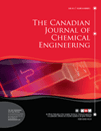
CANADIAN JOURNAL OF CHEMICAL ENGINEERING
Advancing the Frontiers of Chemical EngineeringCanadian Journal of Chemical Engineering, published by Wiley, stands as a pivotal platform in the field of chemical engineering, addressing a myriad of topics essential for researchers, professionals, and students alike. With ISSN 0008-4034 and E-ISSN 1939-019X, this journal has been a cornerstone of chemical engineering scholarship since its inception in 1958 and continues to provide valuable insights through its rigorous peer-reviewed articles. The journal is ranked in the Q2 category of the Scopus quartile rankings, reflecting its influence and relevance within the chemical engineering community, with a notable position of #137 out of 273 in the general chemical engineering field. Although it does not offer open access options, its comprehensive coverage of contemporary research and applications solidifies its status as a vital resource for advancing knowledge and innovation in chemical engineering.
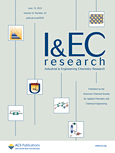
INDUSTRIAL & ENGINEERING CHEMISTRY RESEARCH
Advancing the Frontiers of Chemical Engineering ResearchINDUSTRIAL & ENGINEERING CHEMISTRY RESEARCH, published by the American Chemical Society, is a pivotal journal that disseminates high-quality research in the fields of Chemical Engineering, Chemistry, and Industrial and Manufacturing Engineering. With an impressive impact factor, this journal ranks in the top quartile (Q1) across multiple categories, reflecting its significance and influence within the scientific community. Since its inception in 1987, IECR has provided a platform for researchers, professionals, and students to publish innovative findings that advance the understanding and application of engineering chemistry. Though it operates under a subscription model, the journal continues to foster collaboration within the field, inviting contributions that span theoretical advancements, experimental studies, and practical applications. Whether you are engaged in academia or industry, IECR serves as a vital resource for staying abreast of the latest developments in chemical and engineering research.
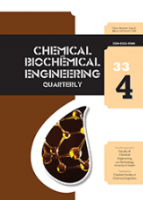
CHEMICAL AND BIOCHEMICAL ENGINEERING QUARTERLY
Innovating Processes, Transforming IndustriesCHEMICAL AND BIOCHEMICAL ENGINEERING QUARTERLY, published by the Croatian Society of Chemical Engineering Technology, is a distinguished open-access journal that has been providing a platform for the dissemination of innovative research since its inception in 1987. With a focus on the fields of biochemistry and chemical engineering, this quarterly journal addresses a wide array of topics, including process chemistry and technology, making significant contributions to both academia and industry. Despite its current positioning in the Q4 category for biochemistry and Q3 for miscellaneous chemistry and process chemistry in 2023, the journal continues to strive for greater impact, catering to researchers, professionals, and students alike. Its open-access model, in place since 2001, ensures that cutting-edge research is accessible to a broad audience, fostering collaboration and knowledge sharing within the scientific community. By promoting high-quality research and providing insights into the latest advancements, Chemical and Biochemical Engineering Quarterly remains an essential resource for those involved in the chemical and biochemical engineering disciplines.
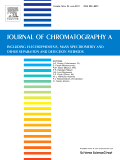
JOURNAL OF CHROMATOGRAPHY A
Connecting Researchers with Cutting-edge DiscoveriesJOURNAL OF CHROMATOGRAPHY A, published by Elsevier, is a leading journal in the disciplines of Analytical Chemistry, Biochemistry, and Organic Chemistry, boasting an impressive 2023 Q2 categorization across multiple fields. With an ISSN of 0021-9673 and an E-ISSN of 1873-3778, this prestigious journal has been at the forefront of chromatography research since its inception in 1958. The journal serves as a vital platform for disseminating high-quality research articles, reviews, and insights into the latest developments in chromatographic techniques and applications, reflecting its standing in the top tier of analytical and organic chemistry literature, evidenced by its impressive Scopus rankings. While it currently operates under a subscription model, the journal continues to make significant contributions to the scientific community by fostering collaboration and innovation in chromatography methodologies. We invite researchers, professionals, and students to engage with the essential findings shared within its pages, which are foundational for advancements in various scientific fields, making it an indispensable resource for enhancing chromatographic knowledge and practice.

Russian Journal of Physical Chemistry B
Advancing the frontiers of physical chemistry.Russian Journal of Physical Chemistry B, published by MAIK NAUKA/INTERPERIODICA/SPRINGER, serves as a vital platform for the dissemination of novel research in the field of physical and theoretical chemistry. With an ISSN of 1990-7931 and an E-ISSN of 1990-7923, this journal has established itself in the academic landscape since its inception in 2008, continuing to publish groundbreaking studies that push the boundaries of chemical research through 2024. Ranked in the Q3 category in Physical and Theoretical Chemistry, it holds a Scopus Rank of 139/189, showcasing its significance despite a competitive field. The journal does not currently offer open access but remains dedicated to advancing knowledge and innovation within its niche, fostering collaboration among chemists, researchers, and educators. As a valuable resource for those seeking to stay abreast of the latest developments and theoretical advancements, the Russian Journal of Physical Chemistry B is an excellent choice for professionals and students alike.

Izvestiya Vuzov-Prikladnaya Khimiya i Biotekhnologiya
Transforming Ideas into Practical ApplicationsIzvestiya Vuzov-Prikladnaya Khimiya i Biotekhnologiya, published by Irkutsk National Research Technical University, is a prominent open-access journal dedicated to advancing the fields of applied chemistry and biotechnology. Since its inception in 2011, this journal has provided a platform for the dissemination of significant research findings, innovative techniques, and technological advancements that bridge the gap between theoretical frameworks and practical applications. The journal is indexed in various databases, ensuring that published works reach a global audience of researchers, professionals, and students eager to explore the latest developments in these critical disciplines. With its commitment to open-access publishing, Izvestiya Vuzov-Prikladnaya Khimiya i Biotekhnologiya plays a vital role in fostering collaboration and knowledge sharing within the scientific community, thus contributing to the advancement of both fields in a rapidly evolving technological landscape.